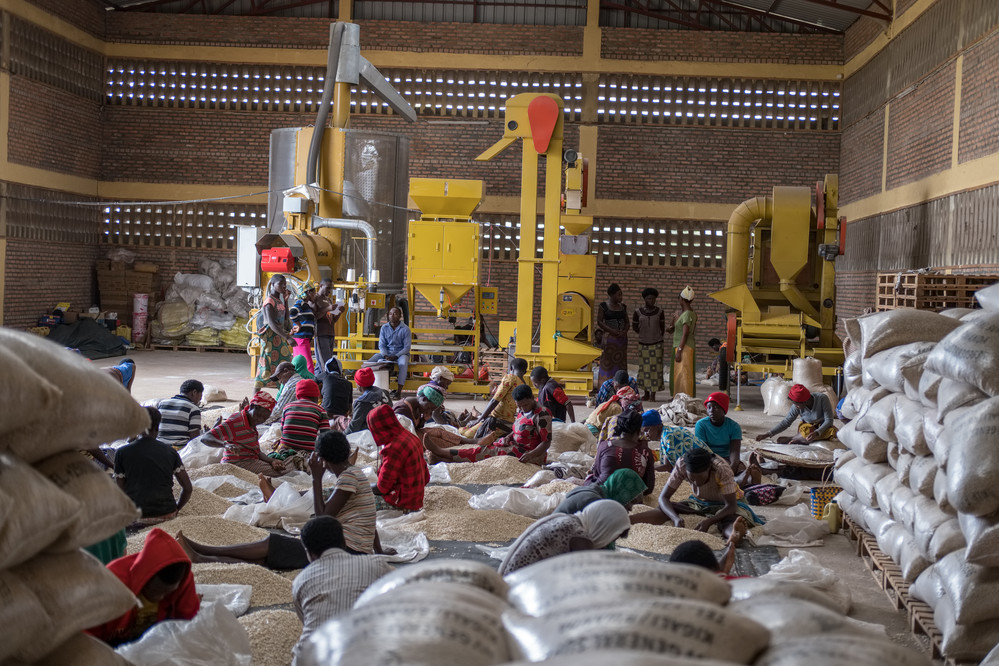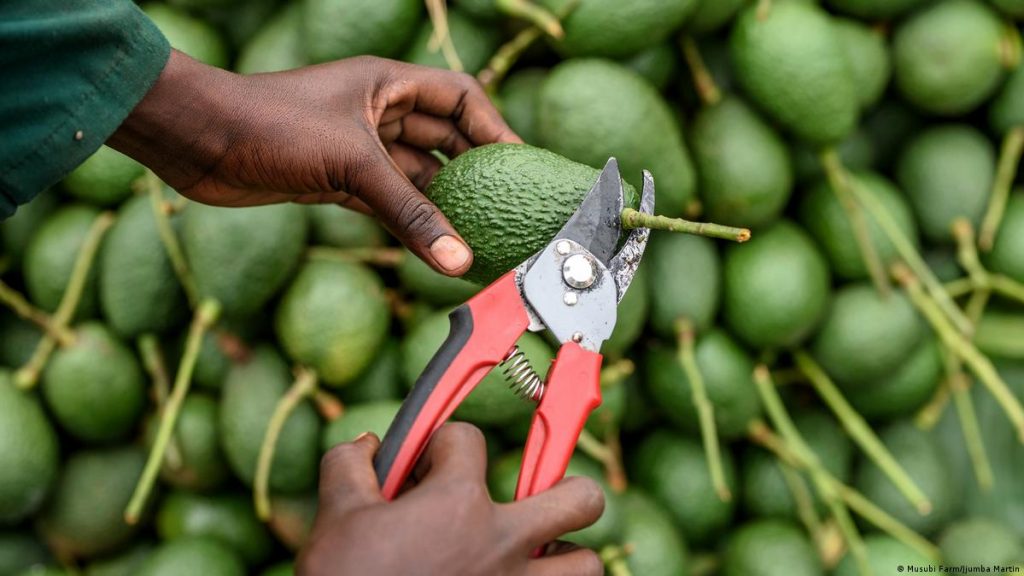The 20/20 blog series, jointly authored by the Mastercard Foundation Fund for Rural Prosperity (FRP) and Rural and Agricultural Finance Learning Lab (the Lab), shares learnings and insights from the FRP portfolio of challenge fund winners. FRP supports businesses that are developing new products, services, or processes that can increase access to finance for rural people in sub-Saharan Africa. The second blog in the series explores lessons from Ibero Uganda.

©IFAD/Radhika Chalasani
Ibero Uganda is part of the Neumann Kaffee Gruppe based in Hamburg, Germany. Ibero Uganda exports quality Ugandan coffees, with warehouses and processing facilities in Kampala and out-stations in all major coffee-producing regions of Uganda. Ibero provides farmers with an ecosystem of complementary services including access to agronomic training, inputs, and markets. In 2017, Ibero was awarded US$1 million by the Mastercard Foundation Fund for Rural Prosperity to set up a Farmer Services Unit (FSU) within its trading operation to provide inputs and loans (a fertilizer advance and a cash advance) to smallholder coffee farmers in Uganda.
In 2017, Ibero Uganda launched a pilot for a new financial product for its coffee farmers: a mobile money cash advance which could be used for whatever the farmer needed, including household consumption needs. This product would be offered in addition to the input credit product they were already providing to farmers. In doing so, Ibero was effectively taking on the role of a financial service provider to a client segment that formal financial institutions in Uganda have historically been unwilling or unable to reach. So how did Ibero, a green coffee exporter, get into the business of lending to farmers in the first place? In this installment of the 20/20 series, the RAF Learning Lab and the Mastercard Foundation Fund for Rural Prosperity explore what drove Ibero Uganda to become a financial service provider to its farmers, and the impact this move has had on their business.
Coffee is by far the largest export product of Uganda, accounting for 20% of export revenues. With approximately 1.3 million households, Uganda has the largest number of coffee farming families in the world. Many coffee farmers in nearly all coffee growing regions of Uganda are in need of productivity-enhancing services — especially fertilizer — and credit products that they can use to invest in farm activities, or cover household expenses that come up throughout the growing season.
Working closely with coffee farming families, including smallholder farmers, is fundamental to the Neumann Kaffee Gruppe’s business model and part of its sustainable sourcing strategy. Coffee farmers receive agronomy and financial literacy training through Ibero Uganda’s Farmer Services Unit (FSU). The FSU also provides them with fertilizer, via an input advance, which Ibero collects repayment for when the farmer delivers coffee at the end of the season. This combination of financial and non-financial support to farmers allows Ibero to grow its sourcing capacity (from 1266 tons in the 2017/18 coffee year to 2520 tons delivered to Ibero in the 2018/19 coffee year), while also helping farmers improve their livelihoods through more consistent productivity and income from the sale of their coffee (impact assessment study forthcoming).
The entry point for delivering these services to farmers is groups: either already existing farmers groups such as depot committees (DCs), groups of up to 400 coffee farmers within a district, or through Village Coffee Organisations (VCOs) which were more recently established as part of the Fund supported project. In both cases, these groups help organize farmers living in a given area, and allow them to bulk their coffee sales to Ibero. Working through groups has enabled Ibero to deploy services to a large number of farmers via a single entry point in a cost-efficient way.
Piloting a mobile money cash advance
All coffee buyers have to contend with the reality of side-selling — when a farmer or cooperative decides to sell their crop to a local trader rather than the business they have an agreement with. In many cases, farmers turn to side-selling to help cover an unexpected or emergency expense, or pay for school fees which are due at a time when household liquidity is at its lowest. Beyond affecting the quantity of coffee Ibero can source, side-selling poses a risk to their ability to recover input loan repayments. Determined to solve this issue in a commercial way, the Farmer Services Unit (FSU) developed and piloted a mobile-based cash advance product. The amount of credit a farmer can access is determined by the amount of coffee the farmer delivered in the previous season. The cash advance can be spent on whatever needs come up during the season — on or off the farm.
Below, we outline three findings from the Fund supported pilot with Ibero.
Finding #1: Most farmers drew from the cash advance only when needed, and often left a balance in their accounts.
At the outset of the pilot, Ibero assumed that farmers would withdraw the full cash advance amount at once. In fact, just after mobile money was availed, about 35% of the total available mobile money was withdrawn by farmers. At the end of the pilot, only 50% of farmers had used the cash advance; of those farmers, 70% took the entire amount, while 30% drew down incrementally as needed.
Some of this behavior can be attributed to high mobile money transaction fees in Uganda, which act as a deterrent. In other cases, it was due to lack of access: farmers gave a phone number that wasn’t their actual registered phone number, so Ibero needed to realign the number to the client. But in speaking to farmers, Ibero learned that fear of over-indebtedness was at the root of most farmers’ decision to just take what they needed and leave the remaining cash advance in their mobile wallets.
Among those farmers who did make use of the cash advance, it was mostly spent on covering farm labor costs and children’s school fees. In only a small number of cases, it was used to cover an emergency, or to invest in another business activity.
Finding #2: A majority of the total advance disbursed by Ibero was repaid by farmers in coffee, meaning that the promise of accessing a higher cash advance amount in the next cycle was an attractive value proposition for farmers.
Ibero expected that most farmers would pay back their cash advance through coffee sales, effectively allowing them to secure higher cash advance amounts in the next cycle. And indeed last year, about 80% of total cash advances were paid back to Ibero in coffee. However, Ibero estimates that farmers sell about 40% of their overall harvest to them, with the rest likely going to local traders or other coffee buyers. Ibero is taking some steps to help ensure that farmers increasingly choose to sell to them rather than local traders by setting up buying stations in the regions where they work with farmers groups. This will make it easier for farmers in the area to bring their coffee to Ibero on a regular basis and receive immediate payment for their crop, without having to wait to bulk larger quantities in order to justify the cost of organising transport of the coffee to Kampala.
Finding #3: High repayment rates for the cash advance product suggests that farmers value their relationship with Ibero, and are willing to pay for the products and services being offered.
Despite the fact that farmers are side-selling a portion of their total harvest, the repayment rate of the cash advance product was over 99% — confirming that lending to this client segment, under the right service delivery model, can have repayment rates that are comparable or even higher than the standard microfinance client segments. For the season ending August 2019, the average loan size of the mobile money cash advance was $140. The delivery of products and services via DCs and VCOs, plus the close relationship Ibero’s field agents maintain with these farmer groups, also help Ibero monitor activity and encourage timely repayment. Ibero’s young and dynamic field force are a key component of the success of this pilot to date: Ibero Uganda management has made a conscious effort to empower their front-line staff by encouraging them to surface feedback and ideas based on their interactions with farmers. This client-centric approach has enabled Ibero to foster a commercial relationship with its farmers that is built on trust and reciprocity.
What can others learn from Ibero’s experience?
1. Ibero Uganda’s success to date illustrates the importance of understanding and responding to farmers’ household needs, rather than just focusing on on-farm activity. Ibero views their farmers’ success as an integral part of their own success as a business, and this requires acknowledging and understanding farming households’ full range of activities beyond coffee farming.
2. Client-centric internal systems and processes allow Ibero to quickly adapt and refine their product offering to farmers. A major success factor in Ibero’s business model is their proximity to and engagement with coffee farmers. Internal systems and processes support information flow between the field force and leadership, and create strong feedback loops to allow for continued adaptation of products and services to suit farmers’ needs. Building this trust with farmers has been crucial to ensuring that these non-collateralized cash advances are repaid, with minimal default rates.
3. It takes time, flexibility, and the right capital structure to figure out the right product design. Access to a financing facility from NKG Coffee Smallholder Livelihoods Facility, along with strong repayment rates, have given Ibero Uganda’s leadership team the freedom and flexibility to test and fine-tune this model. To de-risk the facility, IDH’s Innovative Finance Unit provides a 10% first-loss guarantee, while USAID, ABN AMRO, Rabobank and BNP Paribas offer a working capital credit line with an additional 80% coverage as 2nd loss guarantee. The first-loss guarantee isn’t meant to cover losses in case of farmer non-repayment, but it’s a good backup in terms of other major crises that may affect portfolio quality.
What’s next for Ibero Uganda?
On the back of the success of this participant project under the Fund to reach over 4,000 farmers, Ibero Uganda intends to launch a long-term financing product and set up an MFI to roll out their cash advance to farmers in other regions. Ibero expects that once it reaches between 10,000 and 20,000 farmers (depending on the average loan size), this business model will no longer require subsidy. Farmer capacity building, access to good quality inputs, and the cash advance which discourages side-selling, are all helping Ibero secure higher quantities of better quality green coffee from Ugandan smallholder farmers. Ibero expects that this combination of services will lead to at least an estimated 75% increase in farm-level productivity after 2 years. Additional revenue is generated through interest income from the fertilizer and mobile money advances.
To support the expansion of their lending activities to their farmers, Ibero is in the process of obtaining a Microfinance license in Uganda. While Ibero will always consider itself a coffee buyer first, providing finance is crucial to their ability to secure strong and sustainable supply chains with farmers. The relationship they’ve fostered with farmers, thanks to their dynamic field force and the investments they’ve made along the supply chain, have given them a comparative advantage over commercial banks. It has also increased the proportion of farmers delivering coffee to their farmers groups, and hence to Ibero.
Support from the Fund is helping Ibero Uganda test whether there could be a business case for providing smallholder coffee farmers with financial services, inputs, and agronomic training. At the end of 2019, NKG launched NKG BLOOM as its global sustainable sourcing strategy, with a commitment to provide tailor-made services to at least 300,000 smallholder coffee farming families in 10 countries over the next 10 years.
This article was originally published by RAF Learning Lab

